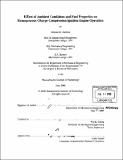Effect of ambient conditions and fuel properties on homogeneous charge compression ignition engine operation
Author(s)
Andreae, Morgan M. (Morgan MacKenzie)
DownloadFull printable version (19.67Mb)
Other Contributors
Massachusetts Institute of Technology. Dept. of Mechanical Engineering.
Advisor
Wai K. Cheng.
Terms of use
Metadata
Show full item recordAbstract
Practical application of Homogeneous Charge Compression Ignition (HCCI) combustion must demonstrate robust responses to variations in environmental conditions. This work examines the impact of ambient conditions and fuel changes on HCCI engine operation, and evaluates cam phasing as a mechanism to compensate for these changes. Experiments were carried out on a modified 2.3 L 14 production engine, and HCCI operation was achieved by the use of residual trapping by negative valve overlap. The first phase of the project examined the impact of changes in intake air temperature and humidity on HCCI operation. Exhaust cam phasing was used to control load, and intake cam phasing was use to produce a change in combustion phasing. Cam timing control was largely able to compensate for changes in combustion due to changes in air temperature and humidity. Higher intake air temperature advanced combustion phasing and resulted in a 1 bar reduction of the net indicated mean effective pressure (NIMEP) at the high load limit for lower engine speeds. Intake air temperature did have more of an impact during lean operation. Higher intake air humidity delayed combustion phasing. (cont.) During stoichiometric operation, this delay allowed a small extension (a few tenths of a bar in NIMEP) in the high load limit. During lean operation, the delay in combustion timing resulted in a reduction of the high load limit. The second phase of the project examined the impact of market fuel composition variations on HCCI operation. Twelve test fuels were created to vary the composition of 5 fuel properties: Research Octane Number (RON), Reid Vapor Pressure (RVP), olefin content, aromatic content, and ethanol content. The test fuels were blends of different commercial refinery streams and contained hundreds of different hydrocarbons to be representative market gasolines. Fuel type was found to have only a small impact on the HCCI operating range, and cam phasing was largely able to compensate for changes in fuel composition. The main effect of the different fuel composition appeared to be differences in ignition delay.
Description
Thesis (Ph. D.)--Massachusetts Institute of Technology, Dept. of Mechanical Engineering, 2006. Includes bibliographical references (p. 197-198).
Date issued
2006Department
Massachusetts Institute of Technology. Department of Mechanical EngineeringPublisher
Massachusetts Institute of Technology
Keywords
Mechanical Engineering.